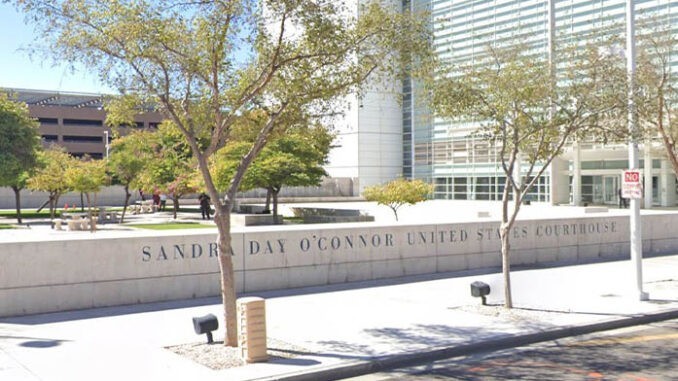
A Mohave County man certified since 2016 to serve as a police officer in Utah has until Jan. 11 to respond to a motion by the Arizona Attorney General’s Office which seeks to dismiss a federal discrimination lawsuit the man filed last year in his years-long struggle to get a certification from Arizona public safety official to protect and serve in Arizona.
Taylor E. Barlow is suing the State of Arizona, on behalf of the Arizona Department of Public Safety (DPS) and the Arizona Peace Officer Standards and Training Board (AZPOST) for discrimination and civil conspiracy. He has also named former DPS Director Frank Milstead, former AZPOST Executive Director Jack Lane, and two AZPOST staff members in their official capacity as well as on an individual basis.
Court records show Barlow was certified in August 2016 by the Utah Police Officer Standards and Training Board to work for the Colorado City Marshal’s Office. The marshal’s office provides public safety services for the sister communities of Hildale, UT and Colorado City, AZ where many members of the Fundamentalist Church of Jesus Christ of Latter-Day Saints (FLDS) live.
Barlow later applied with the Arizona Police Officers Standards and Training Board (AZPOST) in order to serve as a peace officer on the Arizona side of the border. However, he was denied certification, reportedly for three incidents which occurred when Barlow was ages 14 to 18.
“The State of Arizona improperly denied Taylor privileges to become certified as a police officer in Arizona on the basis of Taylor’s resident location and perceived religious affiliation with the…(FLDS),” the complaint alleges, adding “discriminatory actions” undertaken by Arizona officials “has caused extreme harm to Taylor’s reputation and career in law enforcement by making false statements and denying certification when he clearly qualifies.”
According to the lawsuit, there were options available for the Colorado City Marshal’s Office to petition for exceptions that would have qualified Barlow for certification. But the marshal’s office rescinded Barlow’s application in December 2016 after being told there were no AZPOST exceptions to fit Barlow’s conduct of a juvenile conviction at age 14, as well as his alleged involvement in the theft of a vehicle and the sale of a small amount of marijuana when he was 18.
“The Marijuana Allegation was a self-disclosed one-time incident when Taylor disposed of one ounce of marijuana when he was 18 years old,” the lawsuit states.
Colorado City Marshal’s Office made another application on behalf of Barlow in October 2017 but Barlow alleges AZPOST staff instructed the marshal’s office to forego trying to petition for waivers, while approving certifications for others who as adults had reports of “domestic violence and alcohol addiction,” the lawsuit states.
“POST has certified police officers in Arizona that have histories for egregious conduct that should have warranted denial,” the lawsuit states. “Despite many applicants being appointed who were not qualified to be police officers, the Defendants denied Taylor certification when he clearly qualified.”
In December 2017, the AZPOST board formally denied Barlow’s request for certification. He appealed to an Administrative Law Judge (ALJ) who heard testimony in the case in 2018.
According to Barlow’s lawsuit, the ALJ found “there was sufficient evidence that Taylor’s conduct, on all three allegations, would not jeopardize the public trust in law enforcement” if he were granted certification. But in May 2018 the board again shot down Barlow’s application.
“POST’s unjustified denial of certification continues to prevent Taylor’s ability to secure employment in Arizona as a police officer and promotions in law enforcement in Utah,” the lawsuit states. “Defendants’ actions were taken in bad faith and with malice and continue to discriminate to this date.”
Barlow’s case was initially assigned to U.S. District Judge Susan Brnovich but had to be reassigned to another judge because she is married to Arizona Attorney General Mark Brnovich, whose office is representing the state defendants. He seeks monetary damages under several federal codes, as well as the Civil Rights Act of 1964 and the 14th Amendment to the U.S. Constitution.
A decision by a federal judge in Phoenix is expected by summer. Barlow’s civil action in federal court comes on the heels of a failed effort last year to sue the State parties in state court.
